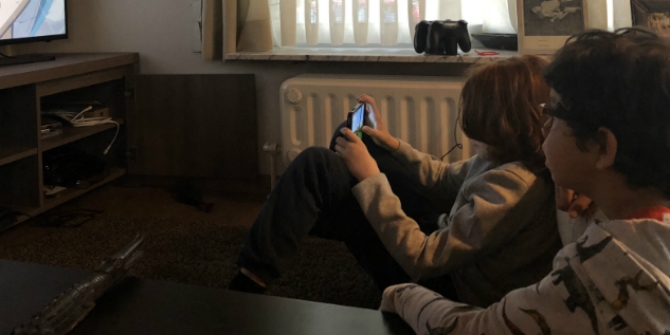 The UN Committee on the Rights of the Child has called for public comments on how to fulfil the digital part of children’s human rights. In this post Anne Collier argues that this is an opportunity to take into account children’s right to participate online – an issue which has often been overlooked in favour of protection. Anne Collier is founder and executive director of The Net Safety Collaborative, home of the US’s social media helpline for schools. She has been writing about youth and digital media at NetFamilyNews.org since before there were blogs, and advising tech companies since 2009.
The UN Committee on the Rights of the Child has called for public comments on how to fulfil the digital part of children’s human rights. In this post Anne Collier argues that this is an opportunity to take into account children’s right to participate online – an issue which has often been overlooked in favour of protection. Anne Collier is founder and executive director of The Net Safety Collaborative, home of the US’s social media helpline for schools. She has been writing about youth and digital media at NetFamilyNews.org since before there were blogs, and advising tech companies since 2009.
This is a pivotal year for children’s online safety and human rights. One important reason is the UN Committee on the Rights of the Child’s call for public comments to help it develop the first General Comment on the digital part of fulfilling children’s human rights. Those rights are extensive. There are 54 articles in the Convention on the Rights of the Child, falling into three categories labelled by scholars as (rights of) Protection, Provision and Participation. Where digital media’s concerned, however, all over the world, children’s participation rights have largely been overlooked in favour of the protection ones. I think I understand why, based on participating in this fascinating public discussion for more than 20 years. I offer some hypotheses below – then try to make the case for changing our approach. Tell me what you think.
We fear what we don’t understand – especially when it involves our children, right? And where tech and the internet are concerned, there’s plenty we, people and societies around the world, don’t understand. In fact, so much keeps happening and changing with technology that we seem locked in a state of perpetual uncertainty. Sometimes there are spikes of fear, but more typically it’s continuous low-grade, gut-level concern.
Scholars call what we’ve been experiencing a “moral panic.” Not all moral panics are about tech or media, but all new tech and media developments seem to bring moral panic with them – from Socrates’s concern about writing things down to Americans’ concerns about telephones and comic books to seemingly everybody’s concern about today’s tech and media. What’s singularly different about today is that new tech and media just keep on coming, with no breaks. We don’t even have time to think about how little we worry anymore about writing and comic books. We have too much to read and watch about smartphones, “screen time” and “tech addiction”). In fact, you probably don’t have time to read this.
So I’ll get to the point: When our children are afraid, we want to protect them. When we’re afraid for our children, we want to protect them. And when things keep changing, the news keeps reporting it and uncertainty keeps sticking around, our fears and the protective instinct they power up never let up, and we want to protect them. Thus the understandable laser focus on children’s protection rights.
So we’re missing something
And we’re not alone. Governments all over the world have shown concern about protecting kids from technology, treating it largely as a public threat. It’s understandable and completely true to form, historically – and there simply is no question we must protect our children – but we and our children are missing some important things in this equation, and it has a lot to do with their rights.
“Wait, why did you just throw ‘children’s rights’ in there?” you might ask. Well, not just because both the World Wide Web and the UN Convention on the Rights of the Child are 30 years old this year. Also because the Committee on the Rights of the Child (CRC) – the people at the UN who monitor implementation of the Convention all over the world – has announced that (after public consultation worldwide) it will issue a new General Comment on children’s digital rights. This is a big deal because it’s the first about digital, the Committee’s reach is global, and “general comments constitute an authoritative interpretation as to what is expected of States parties as they implement the obligations contained in the CRC,” as Child Rights International Network explains (the “States parties” to the CRC are all the countries that have ratified it – every country in the world but the US, in fact).
So what we – and especially our children – have been missing is significant: their participatory rights in digital environments (expression, conscience, assembly and participation). “In practical terms children do not enjoy such rights, and over and again efforts to protect them unthinkingly curtail their participation rights in ways that they themselves are unable to contest,” wrote Professors Sonia Livingstone and Amanda Third in the journal New Media & Society in 2017.
Two metaphors
Why have we been doing this? See that journal article for other reasons, but one obvious one is how we respond to fear. Two metaphors come to mind as I think about the rolling techno-moral panic we’ve been experiencing worldwide: a deer in the headlights (when we’re afraid, we freeze and fixate on the object of fear, stuck in our amygdalas) and triage in an Emergency Room (dealing with the most urgent first, with “first” potentially becoming “forever” if we never get past the urgency). What has happened in societies all over the world is that honouring children’s rights of participation gets swamped by fears fuelled by continuous rapid change.
But “children,” referred to in the CRC as everybody under 18, represent a whopping one-third of the world’s internet users, so that last part about children being “unable to contest” means decisions – such as the GDPR, Europe’s massive (88-page) new data privacy law, which affects youth greatly but was drafted without consulting either youth or youth advocates – are made ostensibly for teens’ own good without any input or perspective from them. This is actually a violation of Art. 12 of the CRC, as Sonia Livingstone points out.
Fearful not helpful
But in a media environment that’s almost impossible to control – or in which it’s nearly impossible to control young media users to the degree many of us would like – triaging for pure protection can actually limit their protection. Because their protection online can’t entirely come through their parents. Our protection won’t cut it – not in a time when the devices we give them allow them to access and carry around virtually the whole world in their pockets. Especially not in a time when it’s so easy for kids to go underground, away from fearful adults trying to monitor and/or control what kids see as their social lives (and do we really want to teach them that control and surveillance are how we keep people safe?). Besides what we hear from child development specialists about kids’ need to do their developmentally appropriate risk assessment and identity production with a reasonable degree of privacy (because it’s hard for anybody besides an amoeba to develop under a microscope), we know intuitively that fear freezes communication. Kids need love, mentoring and support, not fear.
As University of Southern California media professor Henry Jenkins has said and written many times, young people don’t need us looking over their shoulders; they need us to watch their backs as they navigate life in a digital world. They’re less likely to turn to us if we’re all about restriction rather than communication. There was remarkable uniformity in what EU Kids Online researchers in more than two-dozen countries said about the need for parent-child communication channels to be wide open not only to maintain trust but to allow for the mentoring and media skill-building children need to navigate their media environment safely and effectively – to maximise the opportunities it presents. Teaching them the social-emotional skills of social literacy, the internet search and security skills of digital literacy and the critical thinking skills of media literacy, to name a few examples, not only honours their provision rights, it prepares this third of the internet population for their future.
Credibility & authenticity
If those aren’t enough reasons for a balanced approach, here are three possibly even more important ones:
- The credibility factor – credibility with our children. By supporting their participation rights, at the very least we’re allowing them to do what we actually teach them to do in bullying and cyberbullying prevention programs: Don’t just wait for adults to fix things; be upstanders, stand up for each other when someone’s being harmed. We want them to have agency, to be able to effect change for the better and exercise their participation rights so they can exercise their rights of protection as well. We want them to be able to protect themselves, each other and their communities, as well as come to us when they need to.
- Not just bystanders: They already are potential upstanders, or first responders, just by the nature of social media. Way back in the days of MySpace, the US’s Suicide Prevention Lifeline experts reported in 2006 that the Lifeline was getting more referrals from social media users about troubling self-harm posts of their peers than from the hotline’s toll-free phone number. Because of the very social, peer-to-peer nature of our media environment now, our children are each other’s first responders. A more accurate term is suicide prevention experts’ term: they’re each other’s gatekeepers. More than ever they need us to support their agency and teach them effective gatekeeping – what signs to be aware of, where to report posts so experts can provide care, and what to say to be helpful when expert help is on the way – possibly the most important way they would exercise their participation rights.
- Internet safety actually becomes inspiring to them if placed in the framework of their rights – it starts to feel authentically in their best interests in that context. “Digital citizenship” was and still is potentially a step in the right direction, because it implies rights, but in many cases it too has been used as an instrument of control, aimed at “good digital behaviour,” or what is called in this country “classroom management.” Author and University of Oslo researcher Tijana Milosevic wrote in her book Protecting Children Online? that “child rights advocates agree the most important contribution of the UNCRC has been to change the public perception of children from ‘passive objects of charity’ to ‘independent holders of rights’.” What child – or for that matter what human being – could draw dignity or respect from being seen or represented only as a potential victim or a bad actor?
Where should the focus be?
This discussion has to go beyond what we want for our children, though. Of course we want them to be safe and to grow up to be independent, self-actualised human beings who can care about and take care of themselves and others. But what do they want? Their human rights, in digital as well as physical spaces, provide the perfect framework for discovering and delivering that, as well as the protection we want for them.
One of their basic human rights is to be heard, the CRC says – to express their own views “in all matters affecting [them]” – including this General Comment, as the Committee on the Rights of the Child intends to make happen. Now, in this period of international consultation leading up to the Committee’s new General Comment on their digital rights, we need to hear from them.
Danish sociologist Jens Qvortrup argued that children are human beings, not human becomings. The CRC honours them as human beings, so I suggest that – where children’s digital tech and media use is concerned – it’s time to up our game and figure out how to honour the whole CRC.
Notes
This post originally appeared on the NetFamilyNews.org website and it has been reposted here with permission.
This post gives the views of the authors and does not represent the position of the LSE Parenting for a Digital Future blog, nor of the London School of Economics and Political Science.





